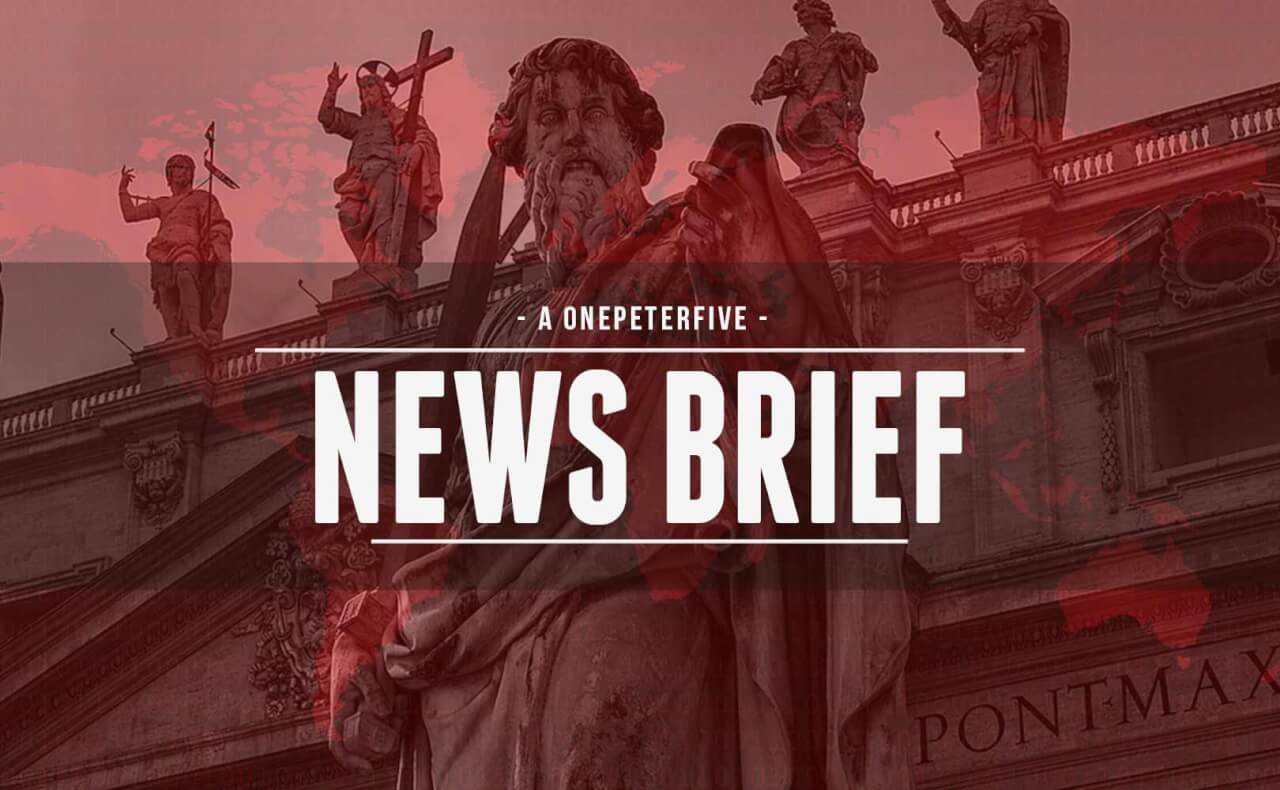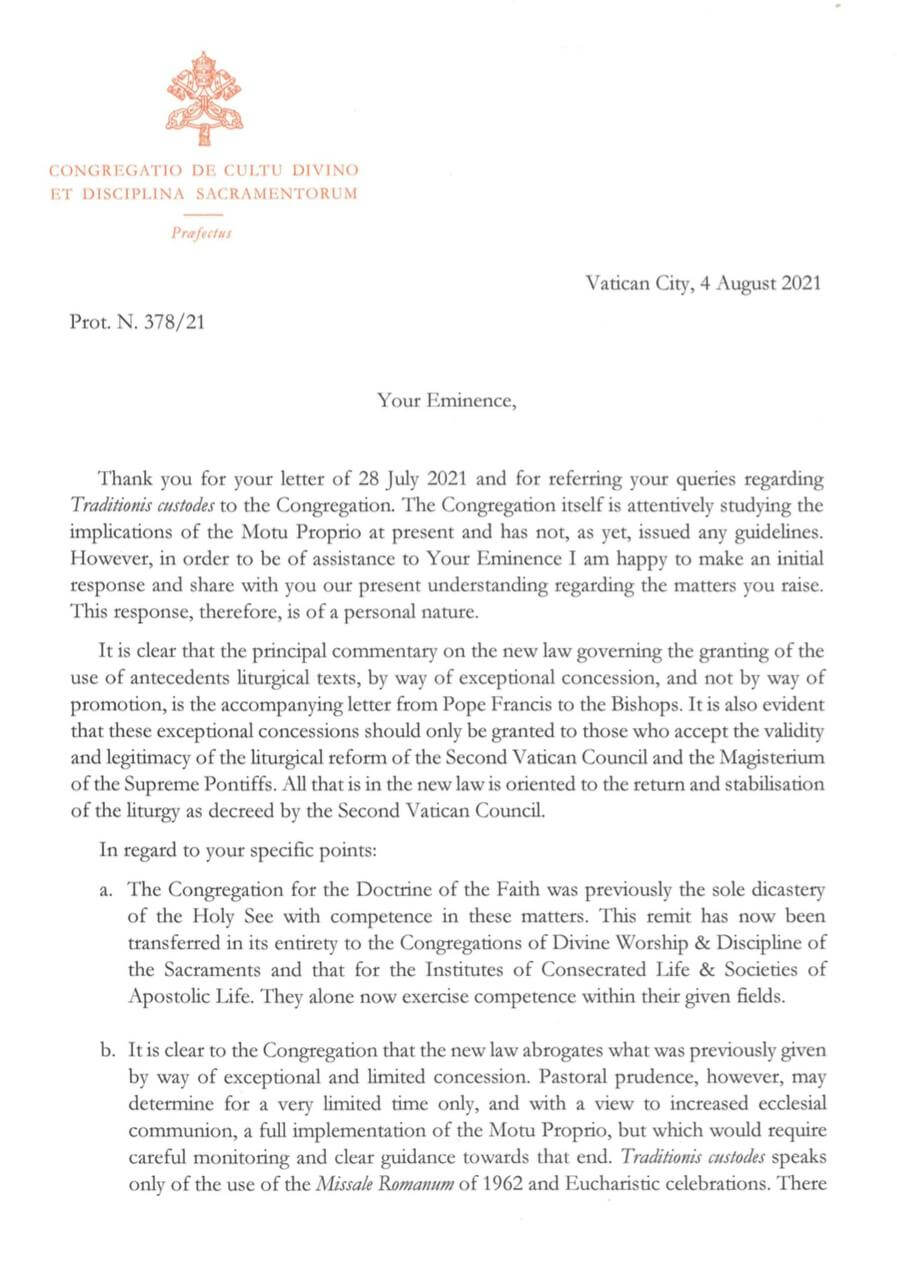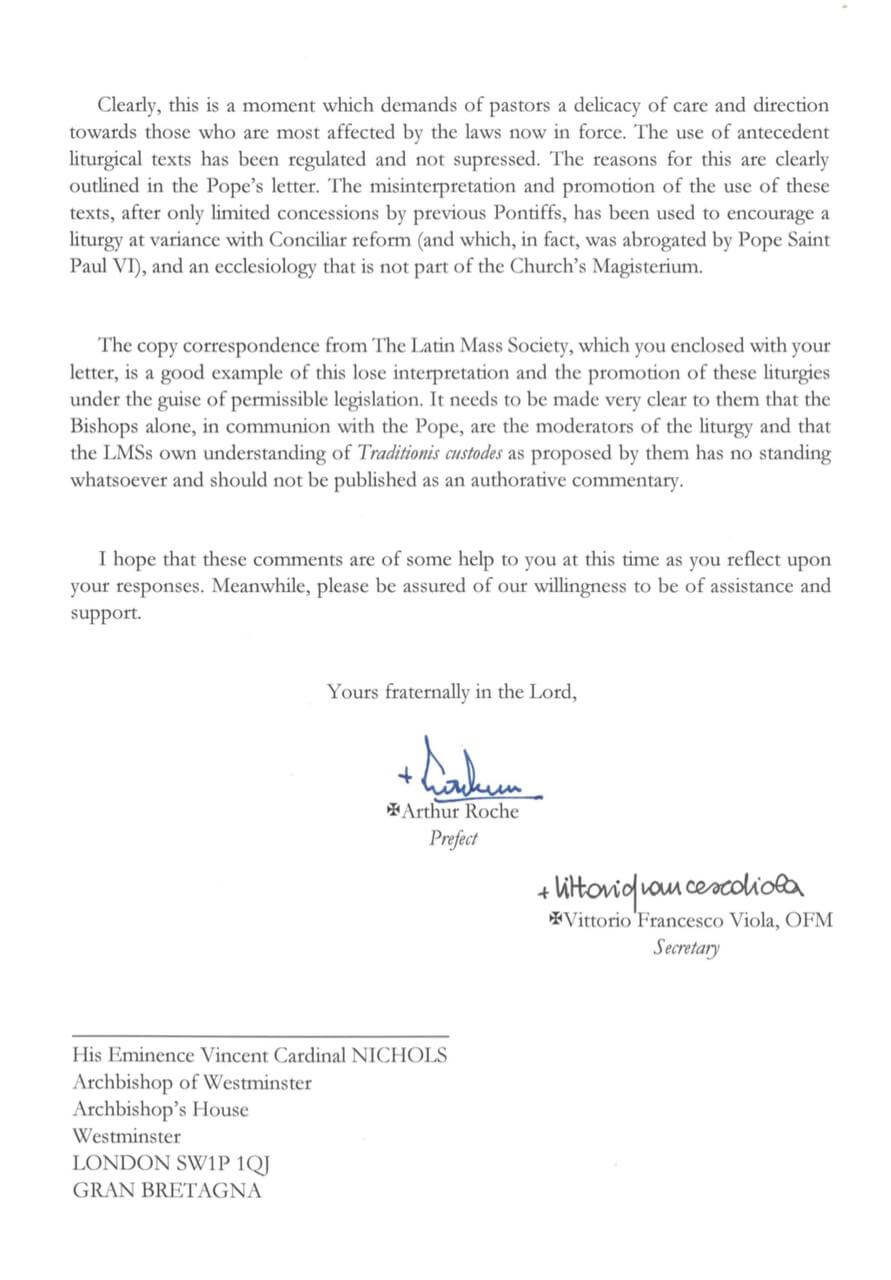Dear OnePeterFive donors, supporters and readers,
OnePeterFive has come into the possession of the following letter from the Vatican Prefect of the Congregation of Divine Worship, Archbishop Arthur Roche, in response to an inquiry shortly after Traditionis Custodes was promulgated. We publish the inquiry and the Vatican response below followed by commentary from our contributing editor, Dr. Joseph Shaw, chairman of the Latin Mass Society of England and Wales, as well as president of Fœderatio Internationalis Una Voce. He is also mentioned in the inquiry.
With due respect to His Excellency and His Eminence, we feel compelled by our vows at baptism and the principles of the saints and the Magisterium to make public this correspondence for the common good of the Mystical Body of Christ and many souls throughout the world.
We direct readers to the recent volume compiled by contributing editor Dr. Peter Kwasniewski, entitled From Benedict’s Peace to Francis’s War, which includes the responses of five cardinals and five bishops to Traditionis Custodes, besides other clerics and laypeople, casting into grave doubt the claim made by the Holy Father that the desire for the ancient Roman Rite is “tied more to the desire and wishes of individual priests than to the real need of the ‘holy People of God.’” This text will help serve the Church in presenting the faithful with the salient issues at play, instead of the misunderstandings lamentably contained in the motu proprio and its accompanying letter.
Let us piously invoke Our Immaculate Lady, Mary, Mother of the Church, for all hierarchs, especially the Roman Pontiff, to hear the cry of their sheep seeking spiritual food; that our shepherds may lay down their lives for the sheep after the model given by Our Good Shepherd, with Whose Precious Blood shed at Calvary we commune at the Most Holy Sacrifice of the Mass.
T. S. Flanders
Editor
Sabbato inf. Hebd. XXIII post Pent.
Commentary
By Joseph Shaw, PhD
President, Fœderatio Internationalis Una Voce
Chairman, Latin Mass Society of England and Wales
These two letters have been going around by email for some time, and it was inevitable that they would be published (it seems Gloria.tv was the first). They have been offered to OnePeterFive and since they are now going to be seen by everyone I can comment on them publicly. Some of the contents are a little technical and obscure, but none of it should surprise us, the basic message is positive, and it also gives us a chance to respond to arguments currently being developed to limit what we can do.
In his letter, Cardinal Nichols asks for clarification on a series of detailed issues from the Curial institution which now has authority in the area, the Congregation for Divine Worship (CDW). Archbishop Roche, the English Prefect of the CDW, replies, sometimes in a slightly vague way, since these were early days in the interpretation of Traditionis Custodes. Some things are not settled; others are not to be settled at all, but left to bishops’ discretion.
The most interesting questions are these.
Other Sacraments
Cardinal Nichols’ question (b) asks about the ‘other sacraments’: marriage, baptism, and so on. If the “previous norms” which permitted them have been abolished, where does that leave them? It is a reasonable question, since they are not mentioned in Traditionis Custodes. The CDW’s response however is not cut and dried. It implies that a “full implementation” of TC would end the provision of the other sacraments: this is not surprising, as TC aspires to end the celebration of the ancient Mass, and it would be odd if the other sacraments continued after that had come to pass. This is immediately qualified, however, by the need for pastoral sensitivity. Then, at the top of the second page of the letter, is a passage rather difficult to follow, but which appears to be criticising the way these matters have developed up to now, as going beyond what was really permitted.
Archbishop Roche may like to refresh his memory of the documents setting up the different Traditional Priestly Institutes, who were explicitly given permission to offer the other sacraments according to the old books. Thus, on 10th September 1988, the Fraternity of St Peter was given this privilege:
In virtue of the faculty granted to it by the Supreme Pontiff John Paul II, the Pontifical Commission Ecclesia Dei concedes to that which is called the “Fraternity of St. Peter”, founded July 18, 1988 and declared of “Pontifical Right” by the Holy See, the faculty of celebrating Mass, and carrying out the rites of the sacraments and other sacred acts, as well as fulfilling the Divine Office according to the typical edition of the liturgical books in force in the year 1962; namely the Missal, Ritual, Pontifical, and Roman Breviary. This faculty may be used in their own churches or oratories; otherwise it may only be used with the consent of the Ordinary of the place, except for the celebration of private Masses.
Anything to the contrary not withstanding.
There are more examples here. This document, of course, has not been abrogated, since it does not conflict with the provisions of Traditionis Custodes (see Article 8).
Lectionary and Calendar
Under points (c) and (d) the CDW affirms that the ancient Mass has a lectionary and a calendar proper to it, and that these should be respected. Vernacular readings (which, I would add, should not replace the proclamation of the readings in Latin) should correspond to the liturgical texts, and not to what the Novus Ordo lectionary happens to provide.
Groups
Point (e) addresses the question of what constitutes a ‘group.’ The Latin Mass Society’s Canonical Guidance on TC suggested that the term must refer to formally instituted entities, as they are said in the text to be “instituted” by bishops and to have a common identity, settled views about Vatican II, and so on. The CDW suggests something similar: they are “personal parishes” and “gatherings of people who have been regularly meeting” for the Old Mass. It does not include, therefore, people who just happen to turn up for Mass. It follows that a priest can choose say a Vetus Ordo Mass one day (if he has a general permission from his bishop to celebrate the “antecedent liturgy”), for all comers, without worrying about the restrictions listed in TC Article 3, which only apply to “groups”.
English Indult
It’s not clear why Cardinal Nichols is asking about the English Indult, whose fiftieth anniversary was yesterday, 5th November. That neither the archive of the Archdiocese of Westminster nor that of the Congregation for Divine Worship has kept a record of this is a poor showing: though certainly not the fault of the two prelates. They can rest assured that the Latin Mass Society has kept a record, and you can see the letter giving the Indult, dated and with its Protocol Number, on our website. It is also recorded in Annibale Bugnini’s own book The Reform of the Liturgy 1948-1975, on pages 297-8 in the English edition.
Honestly, Your Eminence and Your Excellency, we didn’t just make this up!
Conclusions
Cardinal Nichols is very aware of the ultimate, stated aim of TC: the complete cessation of celebrations of the ancient Mass. Archbishop Roche, however, puts the stress on the need for “a delicacy of care and direction”: the old Mass “has been regulated and not supressed.” This is unequivocal good news, and we must not allow any negative phrasing in these letters to distract us from that.
The Latin Mass Society, like Una Voce groups around the world and the Una Voce Federation which represents them, “promotes” the Vetus Ordo. In the current climate, we cannot expect the official organs of the Holy See to approve of this activity: though they did, up to a few months ago. We will see how long it is until the attitude changes again. In the meantime, we will continue to argue for what we think is right, with due respect for persons, as is our right and duty as Catholics (see Canon 225).







